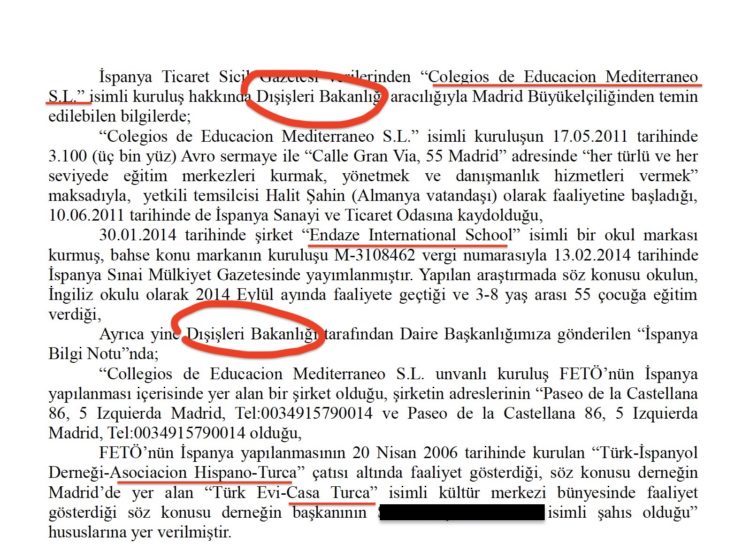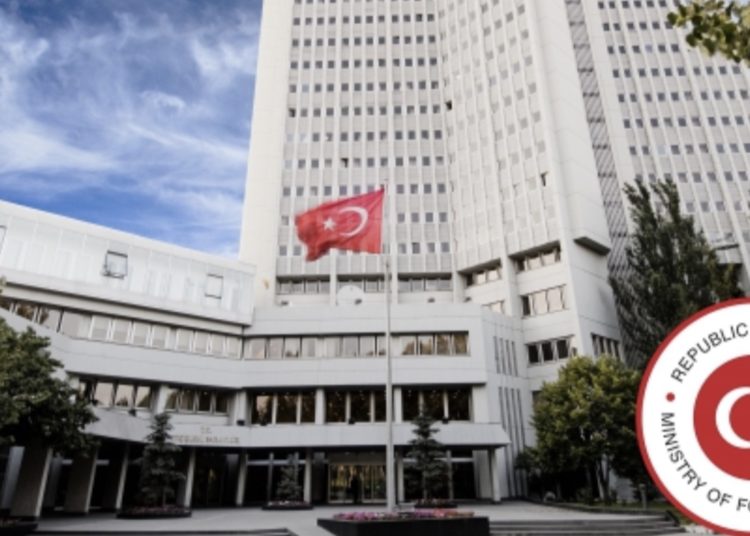The Turkish government used its embassy in Madrid to profile opponents of Turkish President Recep Tayyip Erdoğan and gather intelligence about them to help forge a bogus criminal case against legitimate critics, documents obtained by Nordic Monitor have revealed.
According the official documents, the Turkish Embassy in Madrid had profiled critics of Turkish descent and Spanish institutions affiliated with them and later transmitted these documents to the Foreign Ministry in Ankara. The information collected by the embassy was later used in a criminal indictment for charges of terrorism against these critics. Those individuals who were listed in the documents were banned from entry into Turkey and denied consular services abroad, while those who were in Turkey faced persecution and imprisonment.
The collection of data, amounting to refugee spying or unlawful intelligence gathering by embassy officials, was done after requests from the Anti-Smuggling and Organized Crime Department (Kaçakçılık ve Organize Suçlarla Mücadele Daire Başkanlığı, or KOM) of the Turkish National Police. According to Turkish law, KOM has no jurisdiction abroad and is not authorized to conduct espionage overseas. The information notes sent by the embassy were later incorporated into a report by KOM on Jan. 30, 2017 and were used in criminal prosecution of government critics on terrorism charges.
The report that included the Foreign Ministry intelligence documents was used in several indictments in what was seen as blatant abuse of the criminal justice system by the authoritarian government as part of its crackdown on critics, opponents and dissidents who had nothing at all to do with terrorism. Some of the accused were jailed for months and even years in some cases without formal charges, an indictment or a trial. It also shows how unlawful information gathering by the Turkish Embassy in Madrid was incorporated in the mass persecution of critics back in Turkey.

More specifically, the profiling data collected in Spain by the Turkish Embassy was used as evidence in a case concerning Kaynak Holding, a major conglomerate and the largest publisher in Turkey, which was unlawfully seized by the Erdoğan government on fabricated charges of terrorism in November 2015. Kaynak is owned and operated by businesspeople who are seen as affiliated with the Gülen movement, a civic group that is critical of Erdoğan due to corruption and his government’s aiding and abetting of armed jihadist groups.
The Turkish Embassy documents showed Spanish organization Colegios De Educacion Mediterraneo S.L., an educational institution that was set up by Erdoğan’s critics, was profiled. Halit Şahin, the head of Colegios De Educacion Mediterraneo S.L., was also identified in the embassy document as the person in charge. Şahin, a German national of Turkish background, has been living in Spain for a number of years and leading the organization, which was set up on June 10, 2011.
The Endaze British International School, a private school that was established in 2014 in Madrid, was also spied on by the Turkish Embassy according to the documents. The school offers British education to students of all nationalities, from early schooling to primary and secondary school in line with the Cambridge International Curriculum and other methods. The embassy note even tallied the number of students enrolled in the school, which was promoted by Colegios De Educacion Mediterraneo S.L..
In another information note sent to KOM by the Madrid embassy through the Turkish Foreign Ministry, Asociación Hispano Turca, a Spanish-Turkish association, and Casa-Turca, which was set up in 2006 to promote intercultural dialogue and community understanding, were surveilled. They were branded as organizations linked to terrorism.
Addresses and phone numbers as well as principal officials were included in the intelligence document.
The Erdoğan government brands all of its critics as terrorists, and there are 235 journalists currently locked up in Turkish jails on terrorism charges, making Turkey the world’s leading jailer of journalists. Over 30 percent of all Turkish diplomats, 60 percent of all senior police chiefs, half of all military generals and some 30 percent of all judges and prosecutors in Turkey were also declared terrorists overnight by the executive decisions of the Erdoğan government without any effective administrative investigation and certainly without any judicial proceedings.
A report prepared by the Financial Crimes Investigation Board (MASAK), an agency that was often abused by the Erdoğan government to investigate critics and their companies on criminal pretexts, listed the legitimate business transactions conducted by Colegios De Educacion Mediterraneo S.L. in Spain and Kaynak Holding’s foreign trade arm, Kaynak Dış Ticaret A.Ş., in Turkey in 2014 as if something were suspicious. Nordic Monitor’s investigation found that the transaction was about school supplies provided by a German company but purchased by Kaynak as the authorized seller of the products. Colegios De Educacion Mediterraneo S.L. preferred Kaynak because of flexible credit terms and better pricing provided by the German company to wholesaler Kaynak.
The report was compiled by MASAK on May 13, 2015 under file No. 2015/MAR (62) after the Ankara Public Prosecutor’s Office tasked the agency with investigating Kaynak on Feb. 2, 2015 as part of investigation case No. 2014/75025. Hundreds of people and dozens of firms were dragged into the investigation in what was seen as a crackdown on Turkey’s largest publisher and supplier of educational materials. Some 800 authors were victimized when the government cancelled book contracts after the seizure of Kaynak, and millions of textbooks including ones on foreign language skills were destroyed by the authorities after the takeover.

Among those investigated in this case file was Ekrem Dumanlı, former editor-in-chief of Zaman, Turkey’s largest national newspaper that was unlawfully seized by the government in March 2016 as part of the crackdown on the critical media. Dumanlı has been forced to live in exile along with 150 other journalists who had to flee to avoid wrongful imprisonment.
Although the Turkish prosecutor tried to spin the legitimate business transactions of the Spanish entity as if they were terrorism offenses, the government’s own agency, the Revenue Administration (Gelir İdaresi Başkanlığı or GIB), examined Kaynak’s corporate accounts and its tax filings and concluded that money transfers between Colegios De Educacion Mediterraneo S.L. and Kaynak were connected to the business activities of the company. Sales tax declarations were reviewed by the GIB, and the tax rate had been applied in line with the tax laws as well. In other words, there was nothing wrong with the business transactions, and they certainly had nothing to do with the financing of terrorism as the prosecutor alleged.

However, it was simply impossible for Kaynak to challenge the unlawfulness of the government actions in which all 22 companies of Kaynak Holding were seized on dubious charges after some 30 percent of all judges and prosecutors (well over 4,000) had been purged by the Erdoğan government and replaced with partisans and loyalists.
In July 2017 German newspaper Die Zeit reported that Turkey had handed Germany a list of 68 companies and individuals suspected of links to terrorism due to alleged ties to the Gülen movement. It was also revealed that nearly 700 German firms including industry giants Daimler and BASF were being investigated for “the financing of terrorism” and lodged with Interpol by Turkey. After Germany reacted strongly to the witch-hunt and threatened economic sanctions, Turkey backed down and claimed it was simply a communication error.
Last week, Nordic Monitor published a report disclosing how Turkish embassies and consular officials engaged in spying on government critics in 92 foreign countries as part of profiling and espionage activities that at times amounted to a systematic and deliberate campaign of refugee spying. The document found in the papers released by the Ankara 4th High Criminal Court on Jan. 16, 2019 in case No. 2016/238 that the Turkish Foreign Ministry had compiled a long list of foreign entities that were owned and/or operated by people who were seen as close to the movement.
In document No. 8211250 sent to the prosecutor’s office on Aug. 21, 2015 and incorporated into the evidentiary file as exhibit number 2, the ministry acknowledged it had collected information in many countries in the Americas, Europe, Asia and Oceania. Spain was not listed in this document, but Portugal and the following European countries were listed as having been spied on: Germany, Albania, Austria, Belgium, Bosnia and Herzegovina, Bulgaria, the Czech Republic, Denmark, France, Finland, Croatia, the Netherlands, the United Kingdom, Sweden, Kosovo, Latvia, Lithuania, Luxembourg, Hungary, Macedonia, Moldova, Norway, Poland, Portugal, Romania, Slovenia, Serbia and Ukraine.












